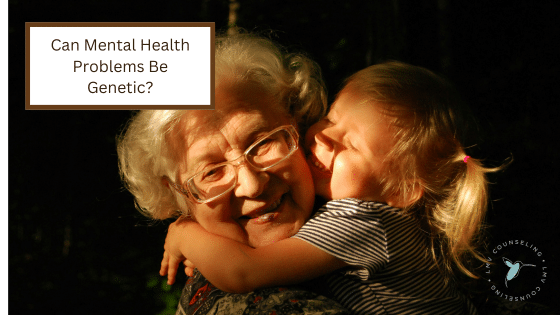Understanding the factors that influence mental health can be complex. You may have heard people ask, “Is mental health genetic?” or “Does mental illness run in families?” The answer isn’t straightforward, but we do know that genetics can play a role in mental health conditions. However, genes alone are rarely the full picture.
At LMV Counseling, we believe that knowledge is empowering, so let’s dive into what we know about genetics and mental health. We’ll break down how genetics, environment, and personal experiences shape mental well-being and offer some tips on what to do if you’re concerned about mental health issues in your family.
What Does Genetics Have to Do With Mental Health?
Genetics can impact your mental health, but it’s only one piece of the puzzle. Studies show that genes influence mental health risk, but this doesn’t mean that any one gene will “cause” a mental health condition. Instead, most mental health issues arise from a mix of genetic, environmental, and personal factors.
How Genetics and Mental Health Connect
Our genes are part of what makes us who we are. Some genetic variations can increase susceptibility to mental health disorders like depression, anxiety, or bipolar disorder. Research has found that some genetic traits, such as certain calcium channel genes, are linked to multiple mental disorders. These shared genetic markers suggest common biological pathways for different mental health conditions.
Family History and Mental Health Risks
A family history of mental health issues can slightly increase your risk. If mental health conditions run in your family, you might be more likely to experience them too. However, genetics is not a guarantee – environmental factors and personal experiences play a significant role in whether someone develops a mental health condition. It’s a good idea to have open conversations with your family about mental health problems they have experienced or other problems family members have experienced.
For example:
- Higher Risk for Family Members: If a close family member, like a parent or sibling, has a mental health disorder, your risk may be somewhat higher.
- Identical Twins Studies: Identical twins share the same genes, so when one twin has a mental illness, the other twin is more likely to develop it as well. But even then, it’s not guaranteed, showing that environment and experience also matter.
 How Genetics, Environment, and Life Experiences Interact
How Genetics, Environment, and Life Experiences Interact
While genetics can shape risk, it’s the interaction with your environment and life experiences that often triggers mental health conditions. Trauma, chronic stress, and lifestyle can all impact whether genetic predispositions lead to a mental health condition.
Consider these factors:
Trauma and Stress: Major life events like loss, trauma, or prolonged stress can affect mental health. Trauma during childhood and in utero can often increase the risk of mental health conditions.
Social and Physical Environment: Factors like the strength of your social support, community, lifestyle, nutrition and even physical health can either protect against or contribute to mental health risks.
Can Genetic Testing Predict Mental Health Conditions?
While genetic testing has advanced, it’s not yet a reliable method for diagnosing or predicting mental health conditions. Genetic testing can sometimes reveal markers associated with mental health risks, but it’s usually not specific or accurate enough to predict if someone will develop a condition. If you’re interested in genetic testing, it’s best to consult a healthcare provider to understand what the results mean.
Genetic testing is available to determine what psychiatric medication might work best for you. It is not a definitive answer of what you can and cannot take, but it provides an educated starting point for you and your physician when making decisions about psychiatric medication.
What Can You Do If Mental Health Issues Run in Your Family?
If you have a family history of mental health conditions, don’t worry – there are steps you can take to reduce your risk and support your mental well-being.
Tips for Taking Action
- Know Your Family History: Learning about your family’s mental health history can be a good first step. Talk to family members if you feel comfortable doing so.
- Take Preventative Steps: Self-care routines like regular exercise, balanced nutrition, and stress management techniques (such as mindfulness or therapy) can help.
- Seek Support Early: If you notice signs of mental health struggles, early intervention can make a big difference. Therapy, whether for prevention or treatment, can help you manage risks and develop coping skills. It can also be helpful to seek support and help after a traumatic event. This can prevent further pathology from developing.

FAQ About Genetics and Mental Health
- Is mental health genetic or environmental?
It’s both. Genetics can increase susceptibility to mental health issues, but environment and personal experiences also play a huge role. - Does having a parent with mental illness mean I will have it too?
Not necessarily. While a family history can raise your risk, it doesn’t guarantee that you’ll develop the same condition. - Can genetic testing tell if I’ll have a mental illness?
Not exactly. Genetic testing may show some risk markers, but it’s not reliable enough to diagnose or predict mental health conditions. - What should I do if mental illness runs in my family?
You can reduce your risk by maintaining a healthy lifestyle, managing stress, and seeking support early if needed. Talking to a therapist can also help you create a plan for mental wellness.
FAQ About LMV Counseling
- What services does LMV Counseling offer?
LMV Counseling offers individual and couples counseling for a range of mental health concerns. Our therapists work with clients experiencing anxiety, depression, trauma, and more. - Where is LMV Counseling located?
We’re based in Wilmington, NC, and offer in-person and virtual sessions to best support your needs. - Does LMV Counseling accept insurance?
Yes, we accept several insurance plans, including BCBS, Aetna, United Healthcare and Cigna. Self-pay options are also available. - Can LMV Counseling help if I have a family history of mental health issues?
Absolutely. Our therapists are experienced in providing guidance and support for individuals with a family history of mental health conditions, helping them navigate risks and build resilience.
Final Thoughts
While genetics can influence mental health, it’s only one factor in a complex picture. If you have a family history of mental health issues, knowing the potential risk factors can empower you to take proactive steps toward your well-being. At LMV Counseling, we’re here to support you on your journey toward mental wellness. Reach out to learn more about how we can help you or your loved ones find balance and peace.

